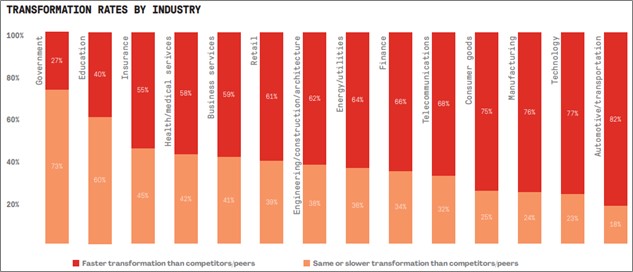Lessons Learned
SECOND EDITION
By Huma Sohrwardy
Dallas, Texas, USA
Abstract
A survey of directors, CEOs’ and senior executives found that transformation risk is their #1 concern. Yet 70% of large-scale Organizational Transformation (OT) initiatives fail to achieve their goals [1].
Multiple factors attribute to OT success, the key ones are companies having a shared vision / strategy internally, high level of senior leadership commitment, employee engagement, organizational agility, clear understanding of market trends and strong program management and program managers.
Successful program managers are subject matter experts (SMEs), have business knowledge, clarity of vision, empathy, and the ability to think outside the box. In recent years, the program manager role has evolved from being a program management SME to understanding the business environment they operate in. This is especially important when managing OT initiatives coupled with an effective and efficient program management framework.
Introduction
This paper describes organizational transformation (OT) and presents, at a high level, key OT areas that play a significant role in achieving successful outcomes.
It elaborates on the delivery framework that supports organizational agility and program management competencies related to OT. Although the key success factors described here are not new, it is the approach and tools to manage them that have evolved.
Pulling from the author’s experience in leading healthcare OT programs, the paper will present OT case studies and lessons learned.
Organizational Transformation
“Transformation refers to an organization achieving a sustainable quantum-leap improvement in performance while transforming the mindsets of employees and thus the culture of the organization” [2]. Transformation focuses on the cultural and operational shift within an organization to support and sustain change [3].
Companies adopt advanced technologies to support transformative change and continuous innovation. This is because digitalization continues to change industry configurations and the traditional competitive landscape [4]. Yet changing the employees’ mindset, winning the hearts and minds, and changing the organization’s culture can be challenging.
Culture can be described as the way employees do things in an organization. It is invisible, intangible, and comprised of unwritten rules that drive employee behavior. According to the management guru, Peter Drucker, “Culture eats strategy for breakfast.” Briefly, the culture of the organization needs to be factored in strategy development and deliberate steps must be taken to drive the cultural shift for successful OT.
Strategic initiatives are the bridge between strategy design and delivery. Program management plays an important role in bridging this gap.
When it comes to emerging technologies that significantly improve organizations’ ability to implement strategic initiatives, automation, cloud computing, artificial intelligence (AI), internet of things (IoT), mobile devices, block chain and apps are some of the most impactful tools [3].
The study conducted by Brightline and the Project Management Institute, found that the automotive, technology, manufacturing, and consumer goods sectors appeared at the top of the list of quickly transforming industries [3] (Figure 1).

Figure 1: Transformation Rates by Industry. Source: Brightline Strategic Report. 2020
Having set the OT context, the next section describes its critical success factors.
More…
To read entire paper, click here
Editor’s note: Second Editions are previously published papers that have continued relevance in today’s project management world, or which were originally published in conference proceedings or in a language other than English. Original publication acknowledged; authors retain copyright. This paper was originally presented at the 15th UT Dallas PM Symposium in May 2023. It is republished here with the permission of the author and conference organizers.
How to cite this paper: Sohrwardy, H. (2023). Managing Organizational Transformation – Lessons Learned; paper presented at the 15th University of Texas at Dallas Project Management Symposium in Richardson, TX, USA in May 2023; republished in the PM World Journal, Vol. XII, Issue IX, September. Available online at https://pmworldlibrary.net/wp-content/uploads/2023/08/pmwj133-Sep2023-Sohrwardy-managing-organizational-transformation-lessons-learned.pdf
About the Author

Huma Sohrwardy
Dallas, TX, USA
![]()
Huma Sohrwardy, PgMP, PMP, MSc is a senior IT / business transformation executive with over 15 years of experience in Healthcare. Leveraging consultative and innovative approaches, she has a track record for delivering business goals through strategy delivery, cross functional leadership and organizational change management. Worked in Transportation, Government, Manufacturing, Finance and non-for-profit sectors in the US and Asia Pacific.
Huma holds a Master of Science degree in Computing and PMI’s globally recognized Program and Project management certifications. She served on the PMI Dallas board and is an adjunct instructor at the Jindal School of Management, UTD. She has recently joined the ISM Dallas Mentor Program at UTD. She can be contacted at hsohrwardy@hztechnologies.com.









